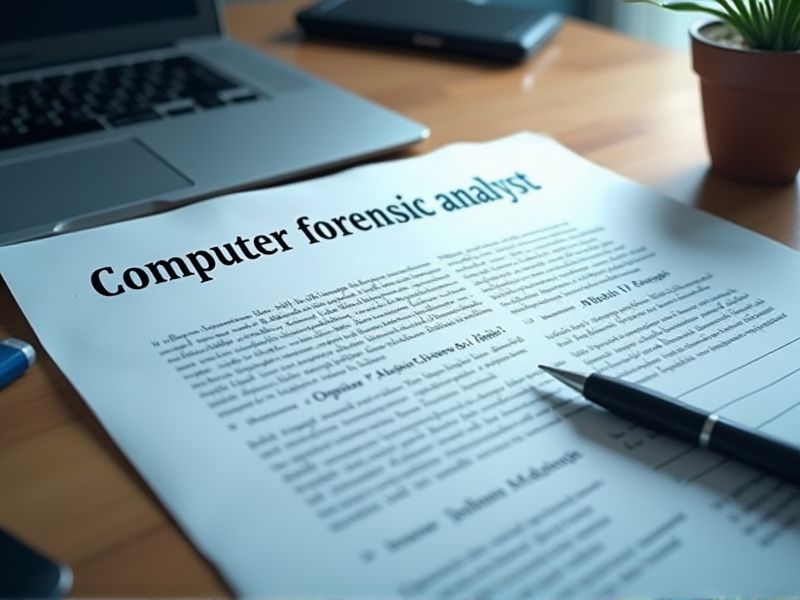
Computer forensic analysts often encounter complex digital evidence that requires specialized knowledge to interpret accurately. Certifications validate an analyst's skills, ensuring they are equipped to handle the intricacies of law enforcement and cybersecurity investigations. Employers prefer certified professionals as it assures proficiency in the latest tools and legal protocols. Key certifications that enhance a computer forensic analyst's capabilities include Certified Computer Examiner (CCE), GIAC Certified Forensic Analyst (GCFA), and EnCase Certified Examiner (EnCE).
EnCase Certified Examiner (EnCE)
Becoming an EnCase Certified Examiner (EnCE) equips computer forensic analysts with proficient skills in using the EnCase software, a leading tool in digital investigations. The certification demonstrates an analyst's ability to efficiently process and analyze digital evidence, which is critical in resolving legal cases involving cybercrime. An EnCE credential enhances credibility and trustworthiness in courtrooms, as it certifies an analyst's competency in handling sensitive information. Employers often seek professionals with this certification to ensure adherence to industry standards and methodologies in forensic examinations.
GIAC Certified Forensic Examiner (GCFE)
The GIAC Certified Forensic Examiner (GCFE) credential is necessary because it equips computer forensic analysts with validated skills in conducting thorough investigations into computer-related incidents. As cybercrimes become increasingly sophisticated, possessing a GCFE assures organizations that analysts can effectively recover and analyze digital evidence. The certification also reinforces an analyst's knowledge of legal and ethical standards pivotal in maintaining the integrity of the investigative process. Holding a GCFE demonstrates a professional's commitment to staying updated with advanced forensic methodologies, crucial for staying ahead in the dynamic field of cybersecurity.
GIAC Certified Forensic Analyst (GCFA)
The GIAC Certified Forensic Analyst (GCFA) credential validates a professional's expertise in conducting intricate forensic investigations, crucial for dissecting complex cyber incidents. Attaining this certification helps analysts gain a structured understanding of advanced threat detection and data recovery techniques, which are pivotal when resolving security breaches. Organizations often require GCFA-certified analysts to ensure that their forensic methodologies align with industry best practices and compliance standards. The certification also enhances an analyst's ability to effectively communicate technical findings to stakeholders, which is essential for informed decision-making during cyber crisis management.
Certified Computer Examiner (CCE)
The complexity of digital evidence requires a Certified Computer Examiner for credibility and precision in analysis. The CCE credential serves as a benchmark for competency, ensuring that a computer forensic analyst meets industry standards. Legal proceedings depend on the reliability of digital forensic evidence, making certification crucial for courtroom validation. Employers often prefer or require CCE certification to guarantee expertise in detecting and investigating cybercrimes.
Certified Forensic Computer Examiner (CFCE)
A Certified Forensic Computer Examiner (CFCE) credential ensures the analyst possesses the necessary skills and knowledge to effectively investigate digital crimes. The CFCE certification enhances credibility in legal proceedings where forensic evidence is critical. It provides a standardized framework for conducting forensic examinations, reducing errors and increasing reliability. Organizations prioritize CFCE-certified professionals to mitigate risks associated with cyber threats and data breaches.
AccessData Certified Examiner (ACE)
The AccessData Certified Examiner (ACE) certification is needed for a computer forensic analyst as it validates specialized skills in using AccessData's forensic tools, ensuring efficient handling of digital investigations. Possessing ACE certification enhances an analyst's credibility and increases their employability in legal and corporate environments. This certification demonstrates a commitment to staying current with industry standards, which is critical given the rapidly evolving nature of digital crime. Employers value the certification as it provides assurance of the analyst's capability to manage complex forensic cases accurately and reliably.
EC-Council Certified Hacking Forensic Investigator (CHFI)
The EC-Council Certified Hacking Forensic Investigator (CHFI) certification provides specialized skills to effectively investigate cybercrimes and recover crucial digital evidence. Possessing a CHFI credential enhances credibility and offers a competitive edge in hiring processes, as organizations value certified expertise. CHFI training aligns with the latest industry standards and forensic technologies, ensuring professionals remain prepared for emerging threats. By equipping analysts with robust methodologies, CHFI supports structured and systematic approaches to solving complex digital incidents.
Certified Information Systems Security Professional (CISSP)
Employers often require a CISSP certification because it validates a comprehensive understanding of cybersecurity practices and principles crucial for computer forensic analysts. Holding a CISSP demonstrates the ability to effectively manage and secure systems while ensuring compliance with information security standards. The certification provides foundational knowledge in risk management and security assessments, core components in forensic investigations. A thorough grasp of the CISSP domains enhances an analyst's capability to develop strategies for incident response and data protection.
Certified Ethical Hacker (CEH)
The CEH certification provides a comprehensive understanding of hacking tools and techniques, which helps computer forensic analysts identify potential security vulnerabilities. Understanding the mindset and strategies of hackers enables forensic analysts to better anticipate and mitigate threats. CEH training enhances an analyst's ability to retrieve and analyze compromised data effectively. In-depth knowledge of ethical hacking contributes to more efficient incident response and investigation procedures.
Certified Information Security Manager (CISM)
Certified Information Security Manager (CISM) certification equips computer forensic analysts with a management-focused perspective, enhancing their ability to integrate security measures into organizational processes effectively. The certification provides in-depth knowledge of information risk management, essential for analysts who often assess and mitigate potential threats. With CISM, analysts gain skills in designing and managing effective security policies, crucial for maintaining data integrity during forensic investigations. The credential is recognized globally, increasing the analyst's credibility and opportunities within international corporations, reflecting their commitment to industry-standard security practices.
Summary
By obtaining certifications, you enhance your credibility and acquire specialized skills in computer forensics. These credentials potentially lead to higher job prospects and career advancement. With certified expertise, you effectively handle complex forensic investigations. Your certifications ensure compliance with industry standards and increase trust among employers and clients.
